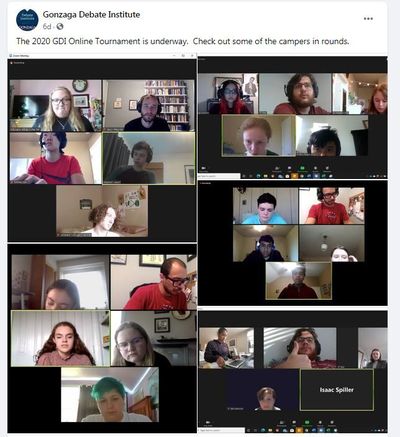Gonzaga’s summer debate camp adapts format to virtual stage

Gonzaga University has been running a summer debate camp for high school students every year for so long that no one remembers when it began. This year, for the first time, the camp was entirely online.
Gonzaga debate coach Glen Frappier said the camp, usually held on campus, has been running since at least the 1960s. It is one of only a handful of large camps across the country centered on debate that happens every year.
“It could be even before,” he said of when the camp began. “No one knows exactly how long. It’s one of the longest running ones.”
Frappier made the decision in April that it would not be safe to bring in young students from around the country and started to figure out how to make the event virtual.
“We knew we had a good product,” he said. “We just had to figure out how to deliver it.”
At the time the camp, which usually attracts between 150 and 175 students, had 70 enrolled. Most of those stayed after the event was switched from in person to virtual. In the end, 150 students signed up.
“The drop off was not what I thought it would be,” he said.
It probably helped that the camp was much more affordable this year since the students didn’t have to pay room and board costs. “The price came down substantially,” he said. “That was something that helped a lot of folks attend.”
But even before his decision to cancel the in-person camp, Frappier and others in the debate community knew there was trouble ahead. As word of the pandemic spread in early March, debaters were gathered in Las Vegas for the debate national championship. Leaders held an ad hoc meeting there about what to do about future events, knowing they probably wouldn’t be possible, he said.
“The debate community was ahead of the curve in terms of canceling events,” he said.
What Frappier and his instructors came up with was a YouTube channel with 150 pre-recorded lectures followed by meetings and debates using specialized online software based on Zoom. The idea was to create content that students could download and watch at their own pace.
“We did a lot of adaptation in how we deliver the curriculum,” he said.
Normally during the on-campus debate camp students are in the classroom from 9 a.m. to 9 p.m. Frappier said he knew that kind of schedule wouldn’t work online and things would have to be simplified. “We just couldn’t do that,” he said. “We knew we had to be flexible.”
The biggest challenge was to make sure students were engaged and interested, Frappier said. They could sign up for camps ranging from one to four weeks long. A lot of what they did was designed around this coming school year’s high school debate topic of criminal justice reform, which Frappier said was both interesting and timely.
“Part of the purpose is to prepare them for next year’s topic,” he said.
The debate students were organized into seven classes, called labs, based on their experience level. One lab was devoted entirely to students in South Korea and Taiwan.
“That lab ran in the middle of the night because they’re 15 hours ahead,” he said.
Gonzaga junior Molly Martin, who has been involved in debate since middle school, taught one of the labs. She’s on the GU debate team and was previously a lab assistant at the camp and is the assistant debate coach at Lewis and Clark High School.
“I got to give minilectures, facilitate drills, and I got to judge a whole bunch of debates,” she said.
But her link to the summer camp goes back even further.
“I went to this camp when I was in high school,” she said. “I fell in love with debate there, and I also fell in love with Gonzaga.”
She liked the challenging but supportive environment at the camp. She credits her experience with debate with teaching her research skills and allowing her to have conversations about a wide variety of issues. “I think it’s given me more opportunities than any other extracurricular activity,” she said.
Martin said she wasn’t sure about how the virtual event would go, particularly because the usual social aspects would be missing. But the students were interested and engaged and everything went well, she said.
“I think it exceeded my expectations,” she said. “We had a pretty overwhelming positive response.”
Frappier estimates that there were 1,100 debates, each lasting at least two hours long, during the camp in June and July.
“The actual debating, that’s something online delivers fairly well,” he said.
The camp ended with a large virtual awards ceremony on Saturday.
“The students were excited and energized and had a good time,” he said. “I think it went really well.”
There was also a silver lining to having the event online. It made it possible for more international students to attend, Frappier said.
“It really enabled us to expand our global footprint,” he said. “We saw an increase in students from Canada and we had students from Switzerland for the first time.”
Frappier said he’s hoping to be able to return to an in-person camp next summer, but, just in case, he’s making plans for another virtual event based on what he learned this year.